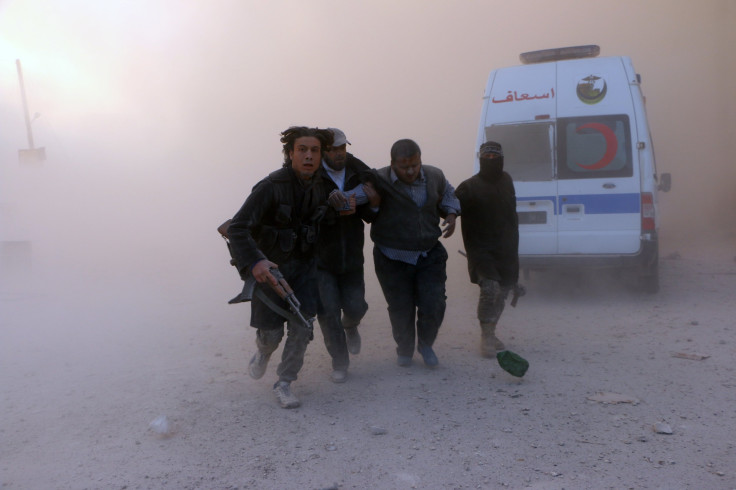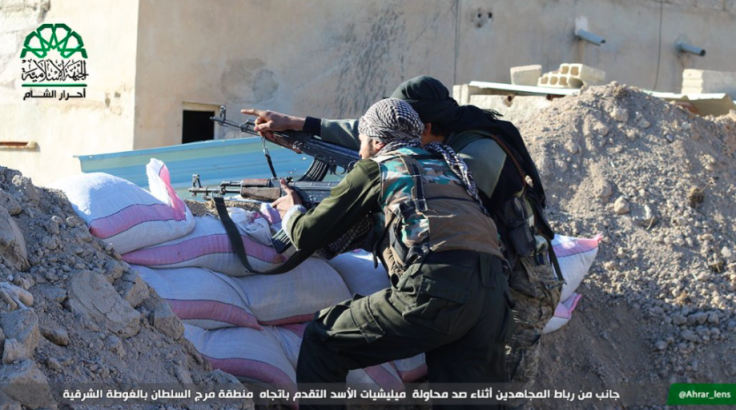Syria Talks: Rebel Negotiations In Saudi Arabia Exclude Key Players In Syrian Opposition

BEIRUT -- A conference designed to unite Syrian rebel factions fighting against President Bashar Assad culminated in an agreement Saturday, despite several disputes along the way: Ahrar al-Sham, a 20,000-strong militant group, pulled out of the negotiations, and another major fighting force, the Nusra Front -- al Qaeda's branch in Syria -- was excluded because of its terrorist links.
Ahrar al-Sham, along with the Nusra Front a member of the Army of Conquest, one of the strongest opposition coalitions, pulled out of the conference on the second day because of the "the fundamental role ... given to personalities linked to the regime,” the group said in a statement.
The first of its kind, the two-day conference in the Saudi Arabian capital of Riyadh was the outcome of a meeting in Vienna last month, when 17 countries decided a unified, internationally backed rebel coalition was the best way to secure a diplomatic solution to the Syrian Civil War. But, in the absence of two of the strongest fighting factions on the ground -- Ahrar al-Sham and the Nusra Front -- participants left with little hope of creating a unified political force that would have the strength to negotiate with the Syrian regime in early 2016 as planned.
"Facts on the ground will matter more than talks in Riyadh, and excluded groups such as the Syrian Kurds, Jabhat al-Nusra [aka the Nusra Front] and the Islamic State remain powerful yet unacceptable players,” the Soufan Group, a security intelligence company that deals with regional conflicts, told International Business Times.
In rare press comments aired Saturday, Nusra Front leader Abu Mohammad al-Golani spoke with Orient News journalists to condemn the talks and accuse the groups that participated of "treason" against the Syrian people.
"It is a plot, not a conference. Such ... gatherings must be foiled," al-Golani said. "The conference was not organized to help the people of Syria. As far as we are concerned, the regime is all but finished ... and in fact it has become more factions than a regime, controlled by this colonel or that general," he said.
Al-Golani also claimed the Free Syrian Army, an umbrella group of moderate Syrian opposition brigades, including fighters trained by the CIA, no longer has a significant presence in Syria.

Besides Ahrar al-Sham, the Nusra Front and the Islamic State group, Syrian Kurdish factions were not represented at the meeting in Riyadh, although "[all] hold territory even if they do not hold a seat at the negotiating table," the Soufan Group said.
Ahrar al-Sham criticized the meeting because it failed to include the Nusra Front -- the groups have historical ties and, in the early years of the Syrian conflict, fought together -- but denied that the two are affiliated in any capacity other than through shared military headquarters as co-members of the Army of Conquest.
"We are not related with al Qaeda, we only fight with them against Assad and ISIS," Ahrar al-Sham's political representative recently told IBT, referring to their shared struggle against the Syrian president and the Islamic State group. "Friendship does not make you belong to the friend."
The talks culminated in a joint-opposition statement with signatories vowing to "create a state based on the principle of citizenship without Bashar Assad or figures of his regime having a place in it or any future political arrangements."
Several opposition sources told France 24 and Reuters that Ahrar al-Sham later re-entered the discussion and reportedly signed the statement. However, the group was unavailable for comment.
Meanwhile, the Nusra Front gave its verdict on the negotiations: Speaking of the opposition groups at the Riyadh talks, al-Golani said, "Even if they agreed, they do not have the power to implement it on the ground."
© Copyright IBTimes 2024. All rights reserved.






















